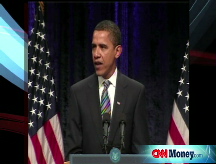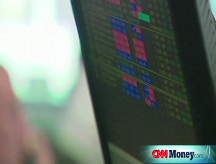Stocks knocked by jobs report
Dow ends down 1.6% as investors fret the loss of another 524,000 jobs in December.
NEW YORK (CNNMoney.com) -- Stocks slumped Friday afternoon after a government report showed another big monthly drop in payrolls, resulting in the biggest annual job loss since just after World War II.
The Dow Jones industrial average (INDU) lost 1.6%. The Standard & Poor's 500 (SPX) index lost 2.1% and the Nasdaq composite (COMP) fell 2.8%.
Stocks tumbled through the morning, briefly trimmed losses in the early afternoon and then tumbled anew in the last hour.
Employers cut 524,000 jobs from their payrolls in the last month of the year after cutting a revised 584,000 in the previous month. That brought 2008's total job losses to nearly 2.6 million, the worst year for workers since 1945.
The 524,000 number was roughly in line with the 525,000 forecast by economists surveyed by Briefing.com. However, many on Wall Street had thought the number might be even higher, after a report earlier this week showed the private sector lost 693,000 jobs in December.
The unemployment rate, generated by a separate survey, rose to 7.2% from a revised 6.8% in November. Economists thought it would rise to 7%.
"There's just nothing good in the report," said Bill Stone, chief investment strategist at PNC Financial Services Group.
"I guess the one positive, and the reason that the market isn't down even more, is that although the payrolls number was basically in line with the consensus, there were rumors that the number would be a lot worse," Stone said.
Stocks rallied through the end of an otherwise abysmal 2008 as investors bet that a new year and new administration will help turn the economy around. While that optimism hasn't disappeared, it has been challenged by a series of poor corporate and economic reports recently.
In addition, President-elect Barack Obama's roughly $775 billion stimulus package remains in flux as lawmakers struggle to agree on the best ways to revive the battered economy.
During the "Santa Claus" rally, investors poured money into equity mutual funds, adding to their investments for only the third week since July. In the week ended Wednesday, investors put $6.4 billion back into stock funds, fund tracker Trim Tabs reported. In the previous week, investors pulled $1.2 billion out of funds.
Next week brings the start of the quarterly earnings period, with Alcoa up first, due Monday after the close.
Stocks, as measured by the S&P 500, have bounced more than 20% off the November bear market lows. But the market selloff this week demonstrates that investors have not necessarily factored in all the bad news, as some experts had thought.
"When you no longer see stocks reacting violently to the adjustments in the economy, you'll know that the market is really looking forward," said Stephen Lauck, president and CEO at Ashfield Capital Partners.
He said investors will show they are looking forward when both poor economic and poor corporate news fail to rattle them. But they aren't at that point yet.
"I am cautiously optimistic that five or six months from now, more people are going to wish they'd put money to work," said Mark Travis, president and CEO at Intrepid Capital Funds. "I think people are closing the barn door after the cows have run out."
Company news: Former Treasury Secretary Robert Rubin said he's stepping down from his role at Citigroup amid criticism of his performance at the bank.
Separately, Citigroup (C, Fortune 500) and Morgan Stanley (MS, Fortune 500) are in talks to merge their brokerage operations, sources told CNN.
Boeing said it is cutting 4,500 jobs, essentially undoing the employment gains it had made in 2008. The company had been one of the few big firms adding employees amid the recession.
No. 1 electronics firm Best Buy (BBY, Fortune 500) narrowed its fiscal 2009 profit forecast, saying it now expects earnings of $2.50 per share to $2.70 per share. That sets the midpoint below analysts' current forecast for $2.61 per share. Shares of Best Buy (BBY, Fortune 500) lost 5%.
Circuit City said it is talking with two companies that could buy it outright or provide it with financing so it can stay afloat. The No. 2 electronics chain filed for bankruptcy protection in November.
Lennar (LEN, Fortune 500) shares plunged as much as 28% after a group accused the No. 2 homebuilder of operating certain joint ventures like a Ponzi scheme. However, shares recovered a bit after the company shot down the accusations.
Wall Street is particularly sensitive to fraud cases in the wake of the scandal involving Bernard Madoff, the financier accused of fleecing investors out of at least $50 billion.
India's Satyam Computer Services has also been in the news. On Friday, police arrested Satyam's former chief executive, who had retired earlier this week after admitting he had falsified accounting records for years.
Market breadth was negative. On the New York Stock Exchange, losers beat winners seven to three on volume of 1.16 billion shares. On the Nasdaq, decliners topped advancers by almost three to one on volume of 1.94 billion shares.
Bonds: Treasury prices fell, raising the yield on the benchmark 10-year note to 2.49% from 2.44% Thursday. Treasury prices and yields move in opposite directions. Yields on the 2-year, 10-year and 30-year Treasurys all hit record lows last month.
Lending rates improved. The 3-month Libor rate fell to 1.26% from 1.35% Thursday, according to Bloomberg.com. Overnight, Libor held steady at 0.10%. Libor is a key bank lending rate.
Other markets: In global trading, Asian markets ended lower and European markets were weaker at midday.
The dollar tumbled versus the yen and gained versus the euro.
U.S. light crude oil for February delivery fell 87 cents to settle at $40.83 a barrel on the New York Mercantile Exchange.
COMEX gold for February delivery rose 50 cents to settle at $855 an ounce.
Gasoline prices rose 2 cents to a national average of $1.782 a gallon, according to a survey of credit-card swipes released Friday by motorist group AAA. ![]()




